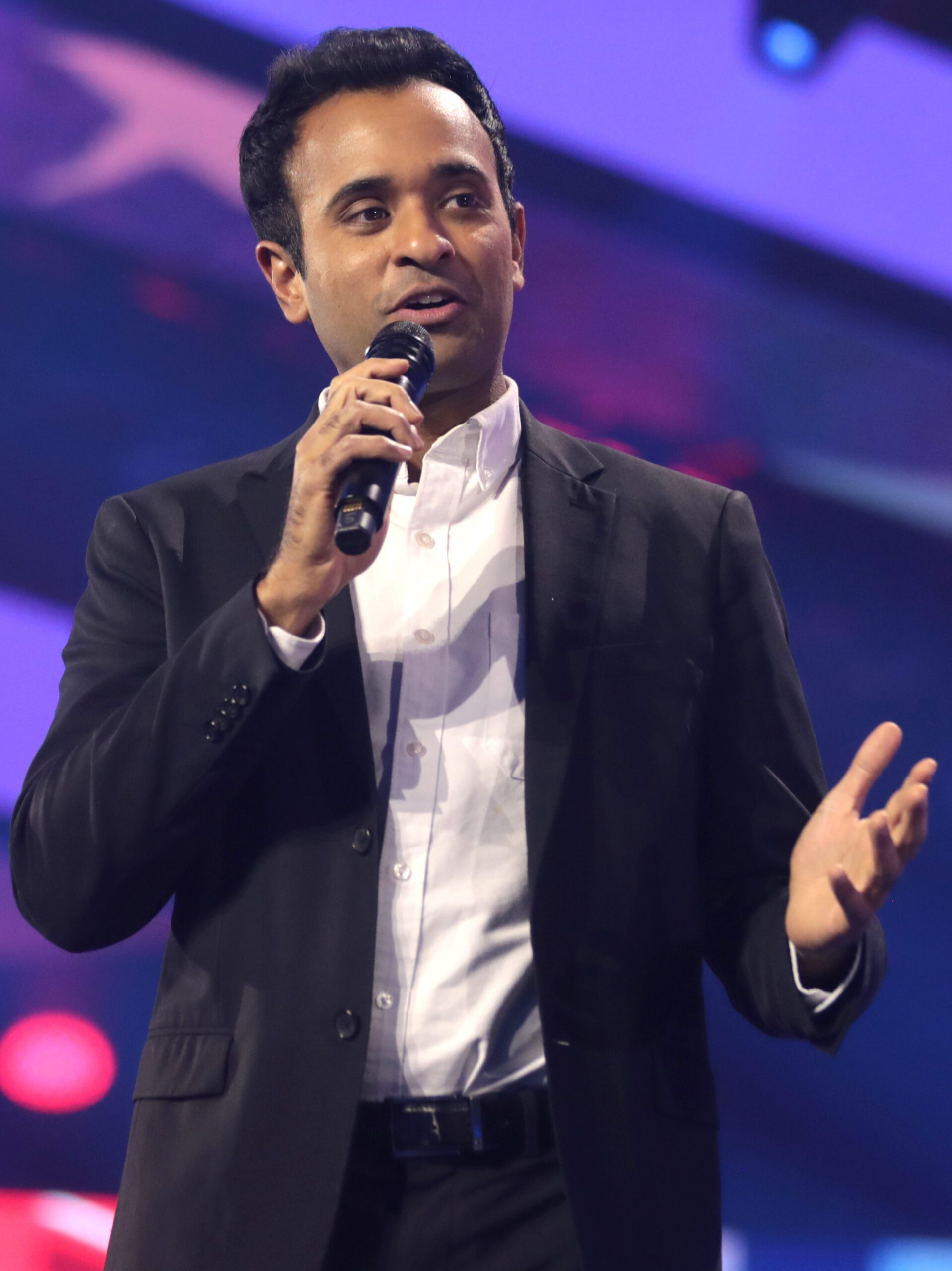Unmasking the Maverick: Vivek Ramaswamy’s Audacious Political Playbook Revealed!
In a political landscape rife with contradictions, the ascent of Vivek Ramaswamy in the Republican primary race has left many bewildered. The young Republican contender’s campaign strategy bears an uncanny resemblance to that of former President Donald J. Trump, raising eyebrows as he channels populist charisma while consistently bending the truth to his advantage. As his visibility grows, so does the scrutiny on his apparent pattern of misinformation, reminiscent of the very figure he’s embraced.
Ramaswamy’s Remarkable Resemblance to Trump: Drawing comparisons to Trump, Ramaswamy has demonstrated a similar penchant for bending reality for political gains. This strategy, marked by unapologetic distortions, has become a focal point of media attention and a point of contention during the recent Republican primary debate.
Layers of Deception: Ramaswamy’s web of distortions encompasses a range of topics, from the 2020 election results and the Capitol attack on January 6th to climate change. When challenged on these claims, he has repeatedly disavowed them, attributing them to misquoting or contextual misunderstanding. However, his attempts to distance himself from previous statements often crumble in the face of documented evidence.
Selective Recollections: One striking instance involves Ramaswamy’s anecdote about a visit to Chicago’s South Side to promote immigration proposals. Contradicting his version, a New York Times reporter’s firsthand account exposed the stark disparity between his retelling and the actual event. Such incidents have prompted his critics to question his credibility and consistency.
A Familiar Script: Ramaswamy’s evasion tactics bear striking similarities to those of former President Trump. He has downplayed contradictions, shifted rhetoric, and accused media outlets of misrepresentation. In an era where authenticity is valued, Ramaswamy’s strategic approach highlights the tension between political image-building and the truth.
Winning Over Trump’s Base: In a bid to win Trump’s fervent base, Ramaswamy’s strategy of tailoring his message aligns with Trump’s style. By casting himself as an outsider and echoing Trump’s refusal to apologize for controversial statements, Ramaswamy appears to be making a play for the core of the Republican Party.
The Art of Deflection: Ramaswamy’s propensity for misleading statements extends to topics like the September 11 attacks. His conspiracy-laden remarks and subsequent attempts to backtrack highlight a pattern of evading accountability. In a similar vein to Trump, he capitalizes on distrust in institutions to appeal to right-wing constituents.
A Future in Flux: As Ramaswamy navigates the treacherous path of political misinformation, his journey raises questions about the ethical boundaries of political discourse. The glaring resemblance between his tactics and those of the former president brings into focus the evolving landscape of political communication.
A Master Class in Political Messaging: While Ramaswamy’s trajectory continues to unfold, his approach to communication and truth-bending serves as a mirror reflecting the complexities of modern politics. His narrative, marked by distortion and strategic evasion, underscores the enduring influence of Trump’s methods and the potential consequences of embracing a post-truth era in politics.
Unraveling the Enigma of Vivek Ramaswamy: The Unconventional Republican Gaining Ground
Introduction: In the ever-surprising Republican primary race, one contender stands out for his ability to both captivate and irritate: Vivek Ramaswamy, a 38-year-old political novice. The prevailing sentiment attached to him seems to be “annoying,” with critics and supporters alike puzzled by his charm. His recent performance in the Republican presidential primary debate only heightened the intrigue, leaving political pundits questioning the factors driving his popularity.
A Polarizing Figure with Surprising Appeal: Ramaswamy’s persona has invoked a mixed response, with even seasoned Republicans finding him irritating. Despite this, his favorability among likely Republican primary voters increased from 50 percent to 60 percent post-debate, accompanied by a rise in his unfavorability rating. Curiously, his campaign reportedly raked in over $1 million in donations the day after the debate, indicating a fervent base of supporters.
The Puzzle of His Supporters: The enigma surrounding Ramaswamy lies in the perplexing allure he holds for his backers. While his overt admiration for Donald Trump does attract some, it doesn’t account for the sizable 10 percent of Republicans who claim they will choose Ramaswamy over Trump. His “woke and cancel-culture guru” stance, although attention-grabbing, can’t be the sole driver either, given the evolving political landscape. Nor does his promise to dismantle the “Great Society” cater to the traditional Trump demographic.
An Outsider Who Appeals to His Critics: Paradoxically, Ramaswamy’s irritants are precisely what draw certain segments of Republicans towards him. The party has often felt marginalized by cultural elites, making Ramaswamy’s representation of such elites an intriguing proposition. His celebrity-like presence, reminiscent of figures like Reagan and Schwarzenegger, taps into the Republican penchant for high-profile candidates.
The Persona of a Meritocratic Parody: Ramaswamy plays a role that resonates with some conservatives – an exaggerated embodiment of meritocratic excellence. His education from elite institutions, entrepreneurial success, and self-assuredness in various fields contribute to his appeal as a class defector. For supporters, his pedigree enhances his status as a “class traitor.”
A Strategic Appeal to Conservative Anxieties: Ramaswamy’s polarizing opinions and apparent gaps in knowledge leave policy enthusiasts bewildered. However, his adeptness at sounding knowledgeable draws in supporters who view him as exceptionally intelligent. Drawing a superficial parallel to Barack Obama, Ramaswamy strikes a chord by affirming conservative grievances against coastal elites.
The Quest for Their Own “Obama”: While many acknowledge that Ramaswamy is unlikely to dethrone Trump, his campaign taps into the Republican desire for their version of Obama. Older white conservatives often feel estranged from younger, more diverse generations, and Ramaswamy exploits this divide to confirm their apprehensions. He critiques his own generation while advocating for measures like civics tests for young voters, appealing to conservative fears about the youth.
Championing Uncomfortable Truths: Ramaswamy’s confrontational approach doesn’t just alienate critics; it resonates with those who see him as a messenger of uncomfortable truths. His assertion that most American racism originates from the left challenges established narratives and appeals to those who feel their views have been marginalized.
Conclusion: Vivek Ramaswamy’s ascent in the Republican primary race, despite his divisive persona, underscores the complexity of political appeal. His ability to embody both the irritating and the attractive elements of modern conservatism makes him a captivating yet puzzling figure. By engaging with conservative insecurities and presenting them through an unexpected lens, Ramaswamy manages to carve out a distinct niche within the party. As the race unfolds, his campaign provides a unique case study in navigating the multifaceted landscape of contemporary politics.
Revolutionizing Hope: How Vivek Ramaswamy’s Vision Sparks Vital Conversation About America’s Youth
As Vivek Ramaswamy, a 38-year-old tech entrepreneur, gains ground in the polls and makes his mark in the Republican primary race, his unique perspective on the challenges facing America’s younger generations has captivated both supporters and skeptics. Campaigning in Iowa, Ramaswamy paints a rather grim picture of the state of millennials and Gen Z, stating that they lack purpose, identity, and meaning, and are adrift in a society increasingly fragmented by issues like race, gender, sexuality, and climate activism.
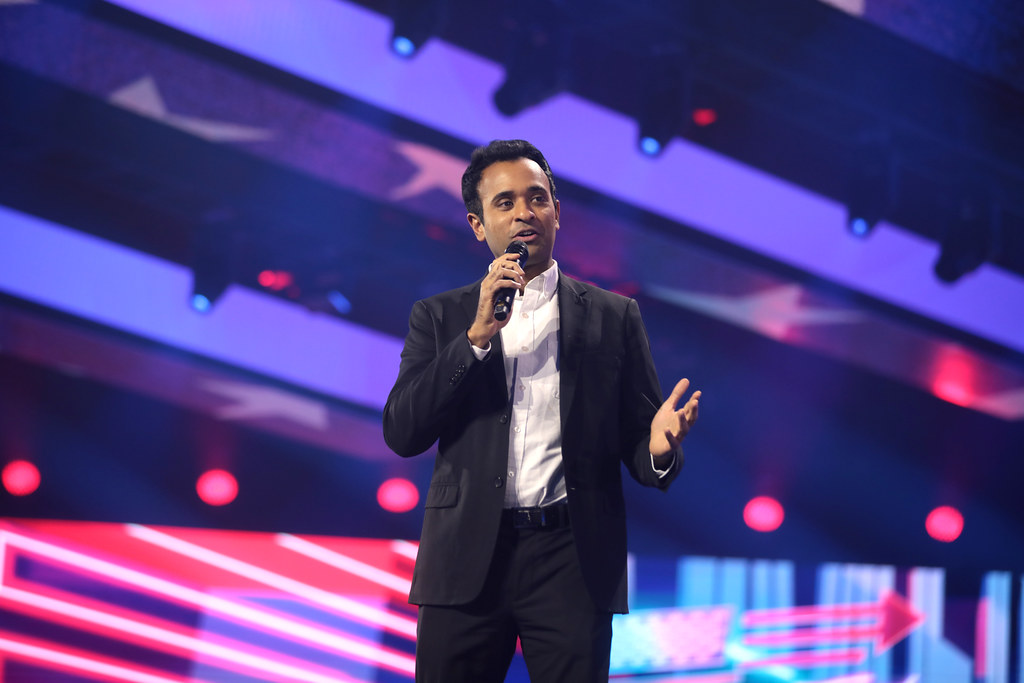
Ramaswamy’s diagnosis might not echo the traditional themes of American exceptionalism, yet it seems to resonate with audiences in Iowa, where he has been drawing large crowds. However, a significant absence among these audiences is young voters. His positions on climate change and the voting age, which he wants to raise and condition upon passing a civics test, set him apart from many in his generation.
Though Ramaswamy has never held public office, his unconventional views have propelled him to third place in national polling averages, a position that’s hard to ignore, even if he remains far behind Donald J. Trump.
While his policy proposals, such as eliminating government agencies, have captured attention, his thoughts on the younger generation have struck a chord. He portrays millennials and Gen Z as grappling with a lack of purpose and identity, which resonates with older audience members who nod in agreement. Some younger attendees find his views divisive or out of touch, but others acknowledge the complexities and struggles that his portrayal brings to light.
Ramaswamy’s assessment is not universally embraced, and there are generational variations in how his views are perceived. Some, like Alex Foley, who values spirituality, find his depiction of a spiritually vacant generation challenging. Others, like Taylor Harrison and Drew Johnson from Generation Z, perceive themselves as dealt a challenging hand rather than lacking purpose entirely.
As Ramaswamy’s campaign gathers momentum, it sparks meaningful conversations about the realities faced by younger generations. While his diagnosis might not sit comfortably with everyone, it has the potential to ignite discussions about identity, purpose, and the direction America is heading.
Elevating Unity: How Vivek Ramaswamy’s Resilience Inspires a New Chapter in American Politics
In recent political debates and on the campaign trail, Vivek Ramaswamy, a tech entrepreneur running for president, has caught attention not just for his policy ideas but also for the challenges people face in pronouncing his name correctly. Despite this, Ramaswamy, who rhymes his first name with “cake” and his last name as “Rah-muh-swah-mee,” has emerged as a notable contender, shaking up the polls and engaging in lively discussions during debates.
The son of Indian American immigrants, Ramaswamy has both embraced and distanced himself from his racial heritage. While he expresses gratitude for being part of the United States, he humorously introduced himself on stage as a “skinny guy with a funny last name,” echoing former President Barack Obama’s sentiment. However, the challenge of getting others to pronounce his name correctly remains.
Ramaswamy’s response to mispronunciations has been casual and understanding. When asked why he didn’t correct a mispronunciation sooner, he simply stated, “I appreciate best efforts.” This approach aligns with his platform, which aims to move away from racial identity politics and foster meaningful debates in America.
Karthick Ramakrishnan, director of AAPI Data, suggests that Ramaswamy’s decision not to police name pronunciation is connected to his positioning as an “insurgent candidate with radical ideas.” Ramakrishnan believes that Ramaswamy’s focus on activating generational debates and bridging divides in America takes precedence over name corrections.
Nicole Holliday, a linguistics professor, points out that English speakers often expect accommodation everywhere, and the lack of foreign language training in the United States contributes to mispronunciations.
It’s not uncommon for candidates with diverse backgrounds to face name-related insults. Ramaswamy’s experience echoes those of past candidates, including Kamala Harris and Barack Obama. The acknowledgment of mispronunciations, however, could indicate a growing recognition of the importance of diversity and respect among Republicans.
Beyond the pronunciation issue, Ramaswamy’s Hindu faith might present challenges. The commentator Ann Coulter’s recent comments about him and Nikki Haley’s religion underscore this. Despite such obstacles, Ramaswamy’s campaign is gaining momentum, drawing support from various voter groups.
In a political landscape where inclusivity matters, Ramaswamy’s unique experiences and responses are shaping his campaign narrative, challenging the norms, and contributing to discussions that extend beyond politics.
Surging Backing for Vivek Ramaswamy, Yet Rivals Lurk for Opportunity
Vivek Ramaswamy is emerging as a strong contender in the 2024 presidential primary race, drawing attention from both media and fellow Republican candidates. Despite being seen as a political newcomer, his recent surge in poll numbers and strategic focus from rivals like Ron DeSantis indicate a pivotal moment in his campaign.
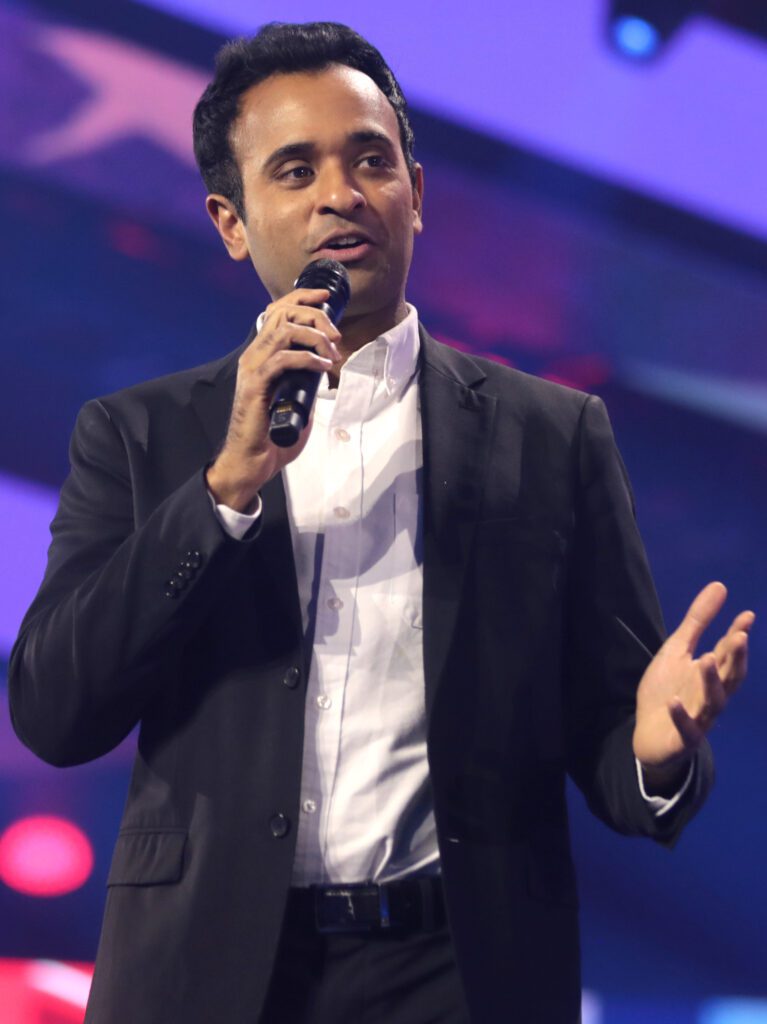
Ramaswamy, an entrepreneur and author, has been touring the early primary states, attracting sizable crowds with unique proposals and media-friendly appearances. While he initially struggled to gain significant attention among his Republican counterparts, recent developments have thrust him into the spotlight just ahead of the first primary debate.
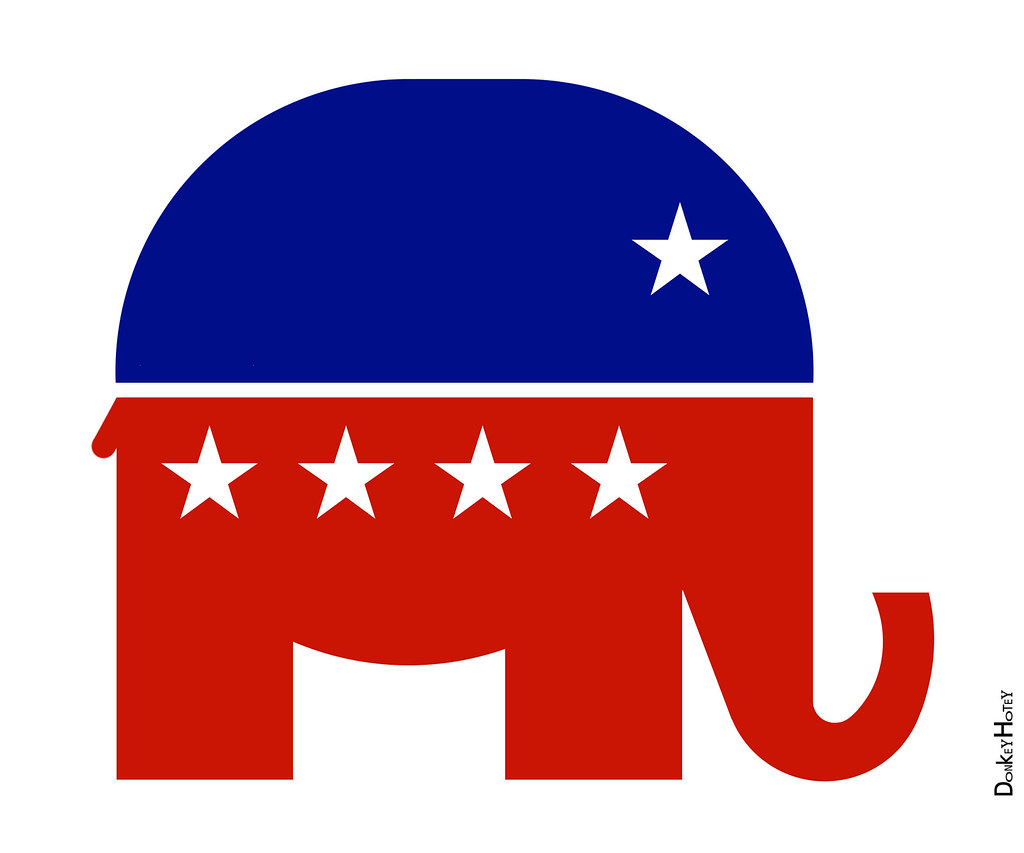
Poll averages place Ramaswamy in third position, trailing behind DeSantis and former President Donald Trump. Notably, Ramaswamy’s national poll numbers are on the rise while DeSantis’s popularity wanes. In a recent Fox News poll, Ramaswamy’s support more than doubled to 11 percent, compared to DeSantis’s 16 percent and Trump’s 53 percent. The gap between Ramaswamy and DeSantis narrowed from 17 to 5 percentage points.
While the DeSantis campaign downplays these numbers due to their resilience against attack ads, internal documents from DeSantis’s super PAC, Never Back Down, reveal that they view Ramaswamy as a legitimate threat. These memos outline vulnerabilities in Ramaswamy’s past positions, such as his support for high inheritance taxes and a business partnership with a Chinese state-owned firm. Additionally, some of his economic and social stances, including free trade and transgender rights, may not align with mainstream Republican voters. His business ventures, which have enriched him but left others struggling, are also under scrutiny.
Current vulnerabilities are not ignored either. Ramaswamy raised eyebrows by suggesting that the United States would defend Taiwan against Chinese aggression only until 2028, raising questions about his foreign policy consistency.
Inexperience is common among new political figures during primary campaigns. Ramaswamy’s youth (he’s 38), innovative ideas, and energy are resonating, particularly in early voting states. In New Hampshire, for instance, his support climbed from 1 to 11 percent in a few months.
Ramaswamy highlighted his youth and the aspirations of millennials during a foreign policy speech, portraying himself as a fresh option for change. He’s appealing to those seeking a more gracious and innovative leader, distinct from traditional political machinery.
However, Ramaswamy faces challenges due to his background, especially among the white, Christian conservative base of the GOP. He comes from an Indian immigrant family and maintains his Hindu faith. Critics, including the DeSantis super PAC, point out his connection to India’s caste system, specifically being born into the Brahmin caste, the highest in Hindu society.
In the eyes of some voters, his name is a hurdle. Despite positive feelings towards him, even supporters sometimes struggle to pronounce his name correctly.
Overall, Vivek Ramaswamy’s unexpected rise in the 2024 Republican primary race is generating significant interest and challenging the established contenders. His youth, fresh ideas, and energetic campaign style are resonating with voters, prompting rivals to take notice and respond strategically. The coming weeks and primary debates will test the durability of Ramaswamy’s momentum and his ability to stand out in a crowded field.
Vivek Ramaswamy: A Confident Newcomer Shaking Up the 2024 Presidential Race
Vivek Ramaswamy is making waves in the 2024 Presidential Race, armed with a powerful secret weapon: unwavering self-confidence. As the first Republican primary debate approaches, the key to success lies in surpassing expectations. This high bar is set for established candidates like Ron DeSantis, armed with name recognition, funding, and buzz.
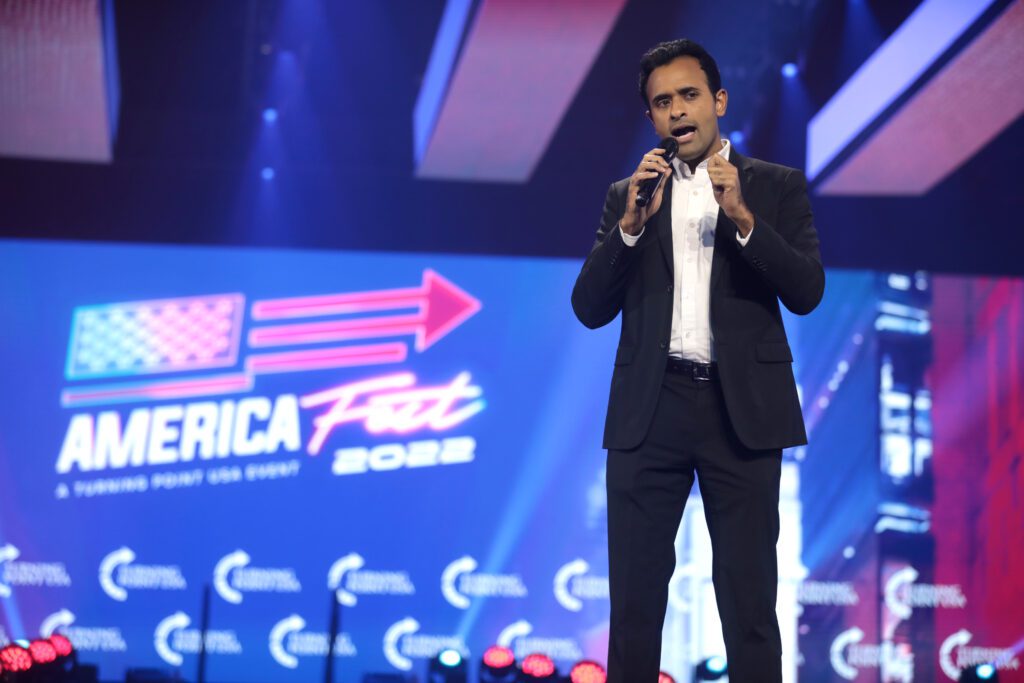
However, the expectations are strikingly low for Vivek Ramaswamy, an entrepreneur with no political background and minimal recognition. But don’t underestimate him—his confidence is unmatched. A Harvard- and Yale-educated child of Indian immigrants, he amassed wealth in biotech and pharmaceuticals. His fervent pro-Trump stance often seems more fitting for a role in a Trump cabinet than the presidency itself. His admiration for the former president is apparent, as is his commitment to potentially pardon Trump if elected.
Ramaswamy’s policy ideas might seem unconventional and inconsistent with his personal narrative. Despite his age of 38, he proposes raising the voting age to 25 unless young adults pass a citizenship test or serve in the military or as first responders. He also aims to eliminate birthright citizenship, despite his family’s immigrant history. His proposals continue to raise eyebrows, advocating using the US military against Mexican cartels and arming Taiwanese families with AK-47s, courtesy of the NRA. He pledges to halt carbon dioxide emission measurements and proposes a 75% cut in the federal bureaucracy, including the FBI.
Despite these head-scratching ideas, Ramaswamy’s campaign gains momentum. Despite being seen as a political newcomer with bewildering notions (like questioning the government’s explanation of 9/11), Ramaswamy is experiencing a significant surge. He is now polling third in multiple polls and second in one recent survey. (This prompted a pro-DeSantis super PAC to advise DeSantis to aggressively confront Ramaswamy in the debate.)
Ramaswamy’s media strategy is reminiscent of Pete Buttigieg and Beto O’Rourke—always available for interviews. Yet, media savviness alone doesn’t explain his campaign’s success. One word defines Ramaswamy’s rise: confidence. While presidential contenders are generally self-assured, Ramaswamy goes a step further. He is a true believer who captivates voters with his conviction, whether genuine or not.
Drawing parallels from the George W. Bush campaigns, where confidence played a vital role, Ramaswamy’s policy prowess rests on his unwavering certainty. He may be frequently mistaken, but he never hesitates. He can captivate audiences with his unwavering belief, as demonstrated by his fearless performance of an Eminem song at the Iowa State Fair.
This brings us to the impending debut debate, where confidence can prove decisive. Having coached presidential candidates for debates, I understand the power of instilling excessive confidence. Ramaswamy, a seasoned debater, can navigate complex arguments effortlessly. His eloquence can bewilder opponents, persuading them with reason and a dash of charm.
Anticipate Ramaswamy to win over hearts, minds, and headlines during the debate. Viewers might find themselves nodding, thinking, “I’m not sure what he said, but I liked how he said it.” Confidence, especially in a political showdown, can be a game-changer.
FAQ(s) about Vivek Ramaswamy
Q1. How did Vivek Ramaswamy make his money?
After completing his studies at Harvard College, Vivek Ramaswamy obtained a bachelor’s degree in biology. He further pursued his education at Yale Law School, where he earned a J.D. degree. Ramaswamy’s professional journey began as an investment partner at a hedge fund. However, he eventually ventured into the field of biotechnology by establishing his own company, Roivant Sciences, in 2014. While he served as the CEO of Roivant until 2021, he continued to be actively involved as the company’s chairman until 2023.
Q2. What is the net worth of Vivek Ramaswamy?
During his twenties, he focused on investing in pharmaceutical companies while working at the hedge fund QVT Financial. Impressively, he achieved the position of a partner by the age of 28, according to Forbes. His net worth, estimated by Forbes, stands at a minimum of $630 million.
Q3. What religion is Vivek Ramaswamy?
A memo from the super PAC backing Florida Governor Ron DeSantis has surfaced, containing opposition research on Republican presidential contender Vivek Ramaswamy. The memo brings up aspects of Ramaswamy’s Hindu faith and his visits to India with his family.
Q4. What nationality is Vivek Ramaswamy?
At 35 years old, he is among the trio of Republican candidates of Indian origin entering the primaries to challenge Donald Trump. Ramaswamy’s roots trace back to Kerala, India, as his parents immigrated to the United States. Born and raised in Cincinnati, Ohio, he carries his upbringing from this city.
Q5. Is Vivek Ramaswamy a billionaire?
In 2023, an advisor to Ramaswamy’s campaign stated that his net worth surpassed $1 billion, although Forbes’ estimation pegged it at $630 million. As of 2016, he resided in New York City. By 2021, he possessed a residence in Butler County, Ohio. However, in 2023, his reported real estate ownership included a house situated in Franklin County, Columbus, Ohio.
Q6. Who is the presidential candidate Vivek Ramaswamy?
Concluding an on-stage interview at the Iowa State Fair over the past weekend, Republican presidential contender Vivek Ramaswamy seized his “singular opportunity.”
Q7. What are the odds for Vivek Ramaswamy?
Various bookmakers are offering odds of around 9-1 for Ramaswamy (equating to a potential $1,000 return on a $100 bet if he secures victory), while DeSantis is positioned at 10-1 (offering a potential return of approximately $1,100 on a $100 bet if he wins).
Q8. Who is the author of woke Inc?
Vivek Ganapathy Ramaswamy is an American entrepreneur who has entered the 2024 Republican Party presidential primaries as a candidate. Born in Cincinnati to parents who immigrated from India, Ramaswamy earned a bachelor’s degree in biology from Harvard College and subsequently obtained a J.D. from Yale Law School.
Q9. Who is the author of woke Inc?
Vivek Ramaswamy is the author of woke Inc.
Q10. What company did Vivek Ramaswamy start?
Prior to establishing Roivant Sciences in 2014, Ramaswamy served as an investment partner at a hedge fund.

